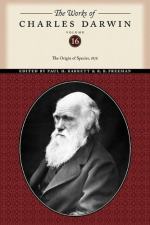Any change in function, which can be effected by insensibly small steps, is within the power of natural selection; so that an organ rendered, during changed habits of life, useless or injurious for one purpose, might easily be modified and used for another purpose. Or an organ might be retained for one alone of its former functions. An organ, when rendered useless, may well be variable, for its variations cannot be checked by natural selection. At whatever period of life disuse or selection reduces an organ, and this will generally be when the being has come to maturity and to its full powers of action, the principle of inheritance at corresponding ages will reproduce the organ in its reduced state at the same age, and consequently will seldom affect or reduce it in the embryo. Thus we can understand the greater relative size of rudimentary organs in the embryo, and their lesser relative size in the adult. But if each step of the process of reduction were to be inherited, not at the corresponding age, but at an extremely early period of life (as we have good reason to believe to be possible) the rudimentary part would tend to be wholly lost, and we should have a case of complete abortion. The principle, also, of economy, explained in a former chapter, by which the materials forming any part or structure, if not useful to the possessor, will be saved as far as is possible, will probably often come into play; and this will tend to cause the entire obliteration of a rudimentary organ.
As the presence of rudimentary organs is thus due to the tendency in every part of the organisation, which has long existed, to be inherited—we can understand, on the genealogical view of classification, how it is that systematists have found rudimentary parts as useful as, or even sometimes more useful than, parts of high physiological importance. Rudimentary organs may be compared with the letters in a word, still retained in the spelling, but become useless in the pronunciation, but which serve as a clue in seeking for its derivation. On the view of descent with modification, we may conclude that the existence of organs in a rudimentary, imperfect, and useless condition, or quite aborted, far from presenting a strange difficulty, as they assuredly do on the ordinary doctrine of creation, might even have been anticipated, and can be accounted for by the laws of inheritance.




